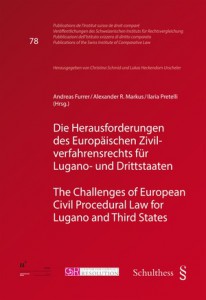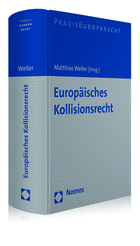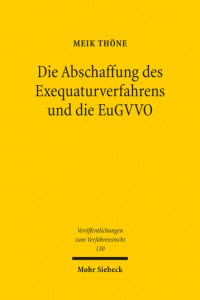The “Cross-Border Litigation in Europe” conference is organised by the Centre for Business Law and Practice, University of Leeds, and the Centre for Private International Law, the University of Aberdeen. The conference is being held within the framework of a research project which is funded by the European Commission Civil Justice Programme.
The event will take place in the London School of Economics (New Academic Building, Lincoln’s Inn Field) on Thursday 16th June and Friday 17th June 2016.
The research study aims to consider whether the Member States’ courts and the CJEU can appropriately deal with the cross-border issues arising under the current EU Civil Justice framework. The project, which is coordinated by Professor Paul Beaumont from the University of Aberdeen, involves Dr Katarina Trimmings and Dr Burcu Yuksel from the University of Aberdeen, Dr Mihail Danov from the University of Leeds (UK), Prof. Dr. Stefania Bariatti from the University of Milan (Italy), Prof. Dr. Jan von Hein from the University of Freiburg (Germany), Prof. Dr. Carmen Otero from Complutense University of Madrid (Spain), Prof. Dr. Thalia Kruger from the University of Antwerp (Belgium), Dr Agnieszka Frackowiak-Adamska from the University of Wroclaw (Poland).
This conference is free to attend, but prior registration is required.
Programme
16th June 2016
9:00 am – 9:30 am
Paul Beaumont (Aberdeen), Mihail Danov (Leeds), Katarina Trimmings (Aberdeen) and Burcu Yuksel (Aberdeen) Evaluating the Effectiveness of the EU Civil Justice Framework: Research Objectives and Preliminary Research Findings from Great Britain
9:30 am – 11:00 am – Cross-Border Civil and Commercial Disputes: Legislative Framework
Chair: Paul Beaumont (Aberdeen)
1) Sophia Tang (Newcastle), Cross-Border Contractual Disputes: The Legislative Framework and Court Practice
2) Michael Wilderspin (European Commission, Legal Services), Cross-Border Non-Contractual Disputes: The Legislative Framework and Court Practice
3) Jon Fitchen (Aberdeen), The Unharmonised Procedural Rules: Is there a case for further harmonisation at EU level?
4) Stephen Dnes (Dundee), Economic considerations of the cross-border litigation pattern
15-minute break
11.15 am – 12.30 pm – Cross-Border Civil and Commercial Disputes: Practical Aspects
Chair: Mihail Danov (Leeds)
1) Peter Hurst (39 Essex Chambers), Litigation Costs: Cross-Border Disputes in England and Wales
2) Susan Dunn (Harbour), Litigation Funders and Cross-Border Disputes
3) Craig Pollack (King & Wood Mallesons), Cross-Border Contractual Disputes: Litigants’ Strategies and Settlement Dynamics
4) Jon Lawrence (Freshfields), Cross-Border Competition Law Damages Actions: Litigants’ Strategies and Settlement Dynamics
Lunch (12.30 pm – 1.30 pm)
1.30 pm – 3.00 pm – Cross-Border Family Disputes
Chair: Thalia Kruger (Antwerp)
1) Paul Beaumont (Aberdeen), Brussels IIa recast – a comment on the Commission’s Proposal from a member of the Commission’s Expert Group
2) Elizabeth Hicks (Irwin Mitchell), Litigants’ strategies and settlement dynamics in cross-border matrimonial disputes
3) Marcus Scott-Manderson QC (4 Paper Buildings), Cross-Border Disputes Involving Children: A View from the English Bar
4) Lara Walker (Sussex), Maintenance and child support: PIL Aspects
5) Rachael Kelsey (SKO), Arbitration and ADR: Cross-Border Family Law Disputes
15-minute break
3.15 pm – 4.45 pm – National Reports: Cross-Border Litigation in Europe
Chair: Stefania Bariatti (Milan)
1) Professor Bea Verschraegen (Universität Wien) and Florian Heindler, Preliminary Research Findings from Austria
2) Dr Teodora Tsenova and Dr Anton Petrov, Preliminary Research Findings from Bulgaria
3) Doc. Dr. Ivana Kunda, Preliminary Research Findings from Croatia
4) Professor JUDr Monika Pauknerová, Jiri Grygar and Marta Zavadilová, Preliminary Research Findings from Czech Republic
5) Professor Nikitas Hatzimihail (University of Cyprus), Preliminary Research Findings from Cyprus
6) Professor Peter Arnt Nielsen (Copenhagen Business School), Preliminary Research Findings from Denmark
15-minute break
5.00 pm – 6.15 pm – National Reports: Cross-Border Litigation in Europe
Chair: Jan von Hein (Freiburg)
1) Maarja Torga (University of Tartu), Preliminary Research Findings from Estonia
2) Gustaf Möller (Krogerus) Preliminary Research Findings from Finland
3) Professor Horatia Muir Watt (Science Po), Professor Jeremy Heymann (Lyon) and Professor Laurence Usunier (Cergy-Pontoise), Preliminary Research Findings from France
4) Aspasia Archontaki and Paata Simsive, Preliminary Research Findings from Greece
5) Dr Csongor Nagy (University of Szeged), Preliminary Research Findings from Hungary
7.00 pm – 10.30 pm Dinner (by invite only) – Old Court Room, Lincoln’s Inn
Speech by Lord Justice Vos (Court of Appeal and President of the European Network of Councils for the Judiciary), The Effect of the European Networks of Councils for the Judiciary (ENCJ) on Cross-Border Dispute Resolution
17th June 2016
8.30 am – 10:00 am – National Reports: Cross-Border Litigation in Europe
Chair: Carmen Otero (Madrid)
1) Maebh Harding (Warwick), Preliminary Research Findings from Ireland
2) Dr Irena Kucina (Ministry of Justice, Latvia), Preliminary Research Findings from Latvia
3) Kristina Praneviciene, Preliminary Research Findings from Lithuania
4) Céline Camara (Max Planck Istitute), Preliminary Research Findings from Luxembourg
5) Clement Mifsud-Bonnici, Preliminary Research Findings from Malta
6) Professor Aukje van Hoek (Universiteit van Amsterdam), Preliminary Research Findings from the Netherlands
15-minute break
10.15 am – 11.30 am – National Reports: Cross-Border Litigation in Europe
Chair: Agnieszka Frackowiak-Adamska (Wroclaw)
1) Professor Elsa Oliveira (Universidade de Lisboa), Preliminary Research Findings from Portugal
2) Dr Ileana Smeureanu (Jones Day, Paris), Lucian Ilie (Lazareff Le Bars) and Ema Dobre (CJEU) Preliminary Research Findings from Romania
3) Doc JUDr M. Duris, JUDr M Vozaryova, Dr M Burdova, Preliminary Research Findings from Slovakia
4) Professor Suzana Kraljic, Preliminary Research Findings from Slovenia
5) Professor Michael Bogdan and Ulf Maunsbach, Preliminary Research Findings from Sweden
15-minute break
11.45 am – 1.00 pm – National Reports: Cross-Border Litigation in Europe
Chair: Alex Layton QC
1) Thalia Kruger (Antwerp) and Eline Ulrix (Antwerp), Preliminary Research Findings from Belgium
2) Jan Von Hein (Freiburg), Preliminary Research Findings from Germany
3) Stefania Bariatti (Milan), Preliminary Research Findings from Italy
4) Agnieszka Frackowiak-Adamska, Agnieszka Guzewicz and ?ukasz Petelski (Wroclaw), Preliminary Research Findings from Poland
5) Carmen Otero (Madrid), Preliminary Research Findings from Spain
Lunch (1.00 pm – 2.00 pm)
2.00 pm – 3.30 pm – Shaping the development of the EU PIL Framework
Chair: Paul Beaumont (Aberdeen)
1) Jacek Garstka (EU Commission, DG Justice), Drafting Legislative Instruments in a Diverse Union 2) Pascale Hecker (Référendaire, CJEU), Cross-Border Litigation: Challenges for EU Judiciary
3) Lady Justice Black (Head of International Family Justice), International Family Justice: Challenges in an EU context
4) Paul Torremans (Nottingham), Cross-Border IP Disputes: Specific Issues and Solutions
15-minute break
3.45 pm – 4:30 pm – The way the EU PIL framework is shaping the litigants’ strategies in a cross-border context
Chair: Mihail Danov (Leeds)
1) Alex Layton QC (20 Essex Chambers), Cross-Border Civil and Commercial Disputes: PIL issues – a view from the English Bar
2) Christopher Wagstaffe QC (29 Bedford Row), Cross-Border Matrimonial Disputes: PIL issues – a view from the English Bar
3) Sophie Eyre (Bird & Bird), Remedies and Recoveries in a Cross-Border Context
4:30 – 5:30 pm – The Way Forward: The research partners’ views
1) Thalia Kruger (Antwerp) and Eline Ulrix (Antwerp), Preliminary Views from Belgium
2) Jan Von Hein (Freiburg), Preliminary Views from Germany
3) Stefania Bariatti (Milan), Preliminary Views from Italy
4) Agnieszka Frackowiak-Adamska, Agnieszka Guzewicz and ?ukasz Petelski (Wroclaw), Preliminary Views from Poland
5) Carmen Otero (Madrid), Preliminary Views from Spain
6) Paul Beaumont (Aberdeen), Mihail Danov (Leeds), Katarina Trimmings (Aberdeen) and Burcu Yuksel, Addressing the Challenges: Is there a case for Reform?
 The new 2007 Lugano Convention, establishing parallelism with the Brussels I Regulation (Reg. 44/2001), had just entered into force in Switzerland in 2010 when it faced a new challenge in the form of the Recast Regulation (Reg. 1215/2012). Therefore, in 2014, CIVPRO (University of Bern), CCR (University of Luzern) and the Swiss Institute for Comparative Law (Lausanne) invited professors, researchers, civil officers and practitioners from all over Europe to discuss the future of European civil procedure with a special focus on Lugano and third states. Alexander Markus (Bern), Andreas Furrer (Luzern) and Ilaria Pretelli (Lausanne) have now published the (English/German) volume containing the keynote speeches and the subsequent contributions to this conference as well as the reports on the discussion in the various panels. This book presents and analyzes the past, the present and the alternative conceivable futures of the Lugano model of a “parallel” convention. For further information, click here.
The new 2007 Lugano Convention, establishing parallelism with the Brussels I Regulation (Reg. 44/2001), had just entered into force in Switzerland in 2010 when it faced a new challenge in the form of the Recast Regulation (Reg. 1215/2012). Therefore, in 2014, CIVPRO (University of Bern), CCR (University of Luzern) and the Swiss Institute for Comparative Law (Lausanne) invited professors, researchers, civil officers and practitioners from all over Europe to discuss the future of European civil procedure with a special focus on Lugano and third states. Alexander Markus (Bern), Andreas Furrer (Luzern) and Ilaria Pretelli (Lausanne) have now published the (English/German) volume containing the keynote speeches and the subsequent contributions to this conference as well as the reports on the discussion in the various panels. This book presents and analyzes the past, the present and the alternative conceivable futures of the Lugano model of a “parallel” convention. For further information, click here. Professor Dr.
Professor Dr. 